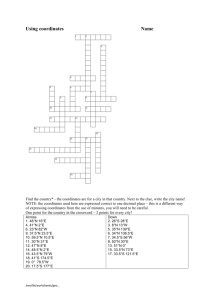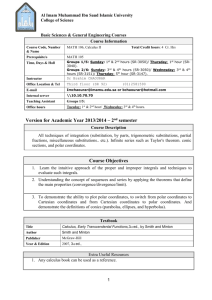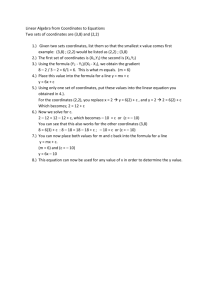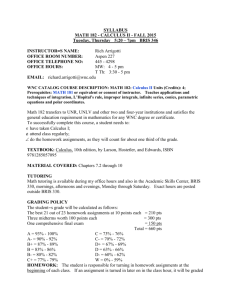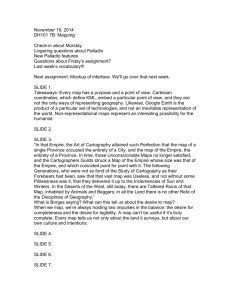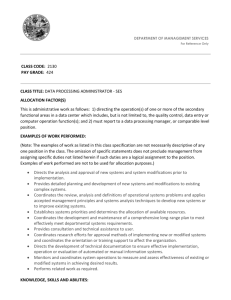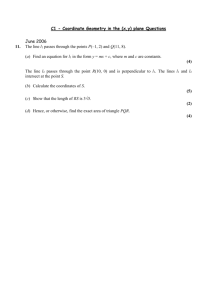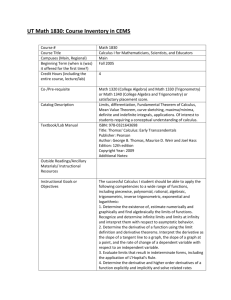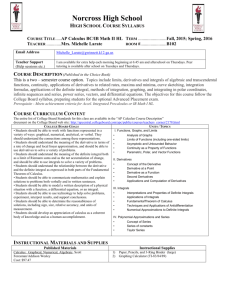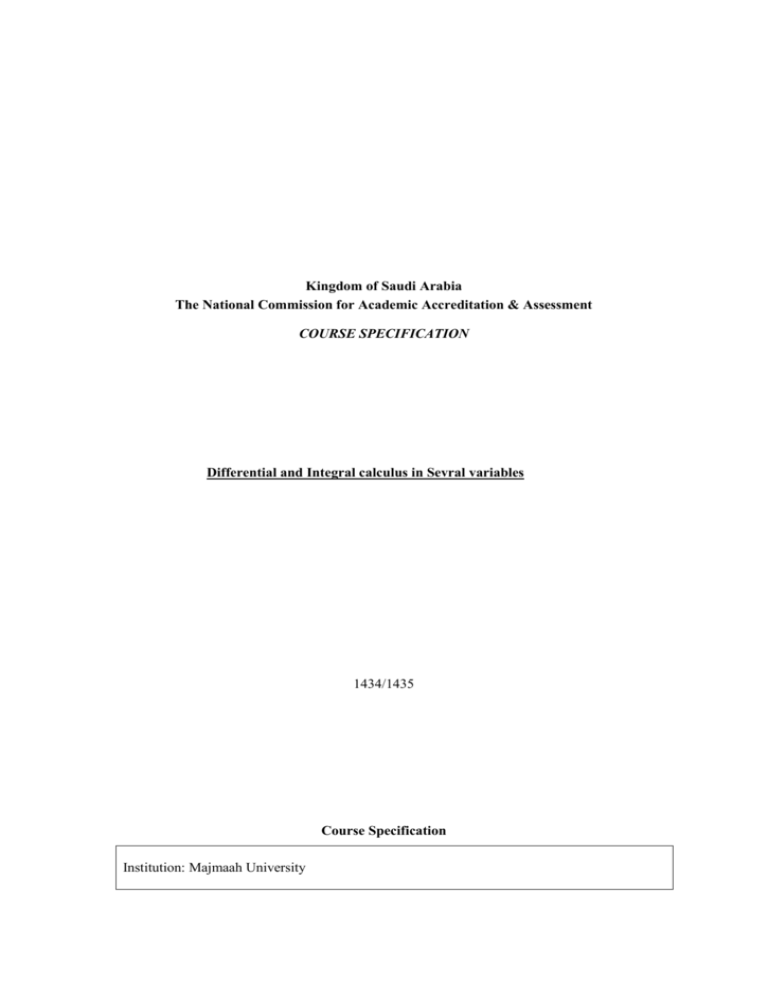
Kingdom of Saudi Arabia
The National Commission for Academic Accreditation & Assessment
COURSE SPECIFICATION
Differential and Integral calculus in Sevral variables
1434/1435
Course Specification
Institution: Majmaah University
College/Department : College of Science in Zulfi/ Mathematics department
A Course Identification and General Information
1- Course title and code: : Differential and Integral calculus in Sevral variables Math
203
2. Credit hours: 3(2+1)
3. Program(s) in which the course is offered. Mathematics
4. Name of faculty member responsible for the course: Hedi Hsine Ben Messaoud
5. Level/year at which this course is offered: level three, second year
6. Pre-requisites for this course (if any) Math 202, Math 101
7. Co-requisites for this course (if any):
8. Location if not on main campus:
B Objectives
1. Summary of the main learning outcomes for students enrolled in the course.
This module aims to provide students with various kinds of complex analysis.
On Completing this module ,student should Understanding to use complex calculus in
various situations.
The student has the knowledge of
1-Cartesian coordinates and vectors in the Euclidian plan and in the space, polar
coordinates, spherical coordinates and cylindrical coordinate, function of two or more
variables.
2-Limits and continuity of a function of two or more variables
3-Directional derivative, Partial derivative and differentiability, local maximum or
minimum of a function of two or more variables.
4-Double and triple integrals in different coordinates, change of variable formula.
5-Series and convergence tests, Expansion of a function in taylor s series.
2. Briefly describe any plans for developing and improving the course that are being
implemented. (eg increased use of IT or web based reference material, changes in content as a
result of new research in the field)
- Looking for any new papers and research in this course and looking for new good references
- Making seminars in the department in this field.
C. Course Description (Note: General description in the form to be used for the Bulletin or
Handbook should be attached)
1. Topics to be Covered
List of Topics
Cartesian coordinates and vectors in the Euclidian plan and in
the space, polar coordinates, spherical coordinates and
cylindrical coordinates, function of two or more variables.
Limits and continuity of a function of two or more variables
Directional derivative, Partial derivative and differentiability,
local maximum or minimum of function of two or more
variables.
Lagrange multipliers and extremum
Double integrals in Cartesian and polar coordinates and
applications.
Triple integrals in Cartesian coordinates, spherical coordinates
and cylindrical coordinates and applications.
Change of variable formula
No of
Weeks
2
Contact
hours
6
1
3
3
9
2
6
2
6
1
3
Series and convergence tests
1
3
Expansion of a function in taylor s series
2
6
2. Course components (total contact hours per semester):
Lecture: 56
Tutorial:
Laboratory
Practical/Field
work/Internship
14
Other:
2. Additional private study/learning hours expected for students per week. (This should
be an average :for the semester not a specific requirement in each week)
At least 6 hours per week study at home independently
4. Development of Learning Outcomes in Domains of Learning
For each of the domains of learning shown below indicate:
A brief summary of the knowledge or skill the course is intended to develop;
A description of the teaching strategies to be used in the course to develop that
knowledge or skill;
The methods of student assessment to be used in the course to evaluate learning
outcomes in the domain concerned.
a. Knowledge
We expect from the student to have the knowledge of:
1- Vectors and different coordinates system in the plan and the space.
2- limits and continuity of a function of two or more variables
3- Directional derivative, partial derivative and derivability of a function of two or more
variables. Extemum of a function of two or more variables.
4- Double integrals and triple integrals in different coordinates and the change of
variable formulas.
5-Series and convergence tests. Expansion of a function in Taylor s series.
(ii) Teaching strategies to be used to develop that knowledge
a) Each topic begins with the explanation of various basic ideas giving plenty of examples so
that the students can understand the ideas and solve some exercises. Provided with a
problem sheets at the beginning of the semester and ask the students to solve these
exercises
b) Students are encouraged to ask questions during the lectures and in the tutorial classes to
come on the board and solve some given problems
c) Students are advised to go to the Library and consult the relevant books on the topic
(iii) Methods of assessment of knowledge acquired
a) Sometime surprise quizzes are given in the class room
b) Homework
c) Two Mid Term exams are conducted one after 5 to 6 weeks of teaching and the other
after 12 to 13 weeks of teaching.
d) Final Semester examination.
b. Cognitive Skills
(i) Cognitive skills to be developed
a) Things are tried to explain in the perspective of the students earlier acquired
knowledge
b) In each lecture it is thoroughly explained as to why the current topic is being
discussed
c) What relationship the current topic has with the previous topic and what should be the
natural subsequent topic
(ii) Teaching strategies to be used to develop these cognitive skills
Generally diagrams, pictorial notation wherever possible are given to explain the complete
and clear ideas
(iii) Methods of assessment of students cognitive skills
Please refer to method of assessments of knowledge
c. Interpersonal Skills and Responsibility
(i) Description of the interpersonal skills and capacity to carry responsibility to be developed
N/A
(ii) Teaching strategies to be used to develop these skills and abilities
N/A
(iii) Methods of assessment of students interpersonal skills and capacity to carry responsibility
N/A
d. Communication, Information Technology and Numerical Skills
(i) Description of the skills to be developed in this domain.
Please refer to earlier item 4a knowledge 1-5
(ii) Teaching strategies to be used to develop these skills
Please refer to earlier item 4a knowledge 1-5
(iii) Methods of assessment of students numerical and communication skills
Please refer to earlier item 4a knowledge 1-5
e. Psychomotor Skills (if applicable)
(i) Description of the psychomotor skills to be developed and the level of performance
required
N/A
(ii) Teaching strategies to be used to develop these skills
N/A
(iii) Methods of assessment of students psychomotor skills
N/A
5. Schedule of Assessment Tasks for Students During the Semester
Assess
ment
Assessment task (eg. essay, test, group project,
examination etc.)
1
First Mid Term Examination
2
Second Mid term Examination
3
Tutorial
4
Final Semester Examination
Week due
Proportion
of Final
Assessment
6
25%
12
25%
over the whole semester
10%
16
40%
D. Student Support
1. Arrangements for availability of faculty for individual student consultations and academic
advice. (include amount of time faculty are available each week)
students are encouraged to come during the office hours (4 hours per week) to discuss their
mathematical problems and difficulties they face
E Learning Resources
1. Required Text(s)
(1) Robert Wrede and Murray R.Spiegel : Theory and problems of advanced calculus.
Hartford Graduate Center.
(2) Ian Craw : Advanced Calculus and Analysis, 2000, University of Aberdeen.
(3) R.E Larsen and R.P Hostetler: Calculus with Analytic geometry, D. C Health and
Company, 1994.
2. Essential References
Thomas : Calculus, Eleven Edition, Pearson Addison Wesley, 2005.
3- Any papers or books in the library having the same topics
4-.Electronic Materials, Web Sites etc
http://www.sciencedirect.com/
-http://www.siam.org//
http://www.cmi.univ-mrs.fr//
http://www.arxiv.org//
http://www.lms.ac.uk/
http://www.ams.org/
http:// mathforum.org/advanced/numerical.html/
http://www.ingentaconnect.com/ content/
http://www.zentrablblatt-math.org/ zmath/en/
http://www.ma.hw.ac.uk
5- Other learning material such as computer-based programs/CD, professional
standards/regulations
N/A
F. Facilities Required
Indicate requirements for the course including size of classrooms and laboratories (ie number
of seats in classrooms and laboratories, extent of computer access etc.)
1. Accommodation (Lecture rooms, laboratories, etc.)
Lecture rooms must be suitable to the number of students
2. Computing resources
Computer and Projector
3. Other resources (specify --eg. If specific laboratory equipment is required, list requirements
or attach list)
N/A
G Course Evaluation and Improvement Processes
1 Strategies for Obtaining Student Feedback on Effectiveness of Teaching
At the end of the semester feedback is taken from the students on a prescribed Performa
2 Other Strategies for Evaluation of Teaching by the Instructor or by the Department
Departmental meetings, frequent meetings/ consultation among the teaching staffs,
meeting between course coordinators and the tutors
3 Processes for Improvement of Teaching
This may be done from time to time by the course coordinator in consultation with other
faculty members teaching this course, and expert opinion may be taken
4. Processes for Verifying Standards of Student Achievement (eg. check marking by an
independent faculty member of a sample of student work, periodic exchange and remarking of
a sample of assignments with a faculty member in another institution)
The course material and knowledge acquired by the students are periodically reviewed and
changes if necessary are approved by the department
Please refer to The Salient features
5 Describe the planning arrangements for periodically reviewing course effectiveness and
planning for improvement.
The chairman and the faculty implement the proposed changes, if any.

